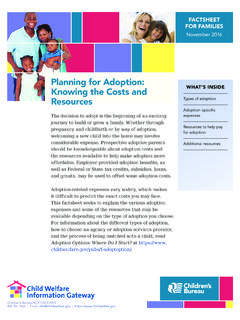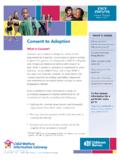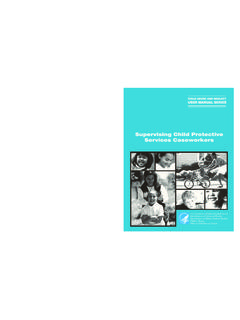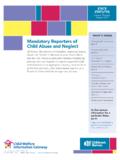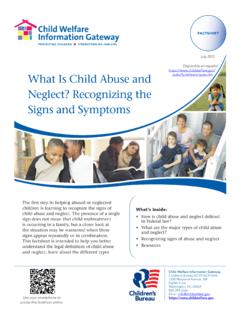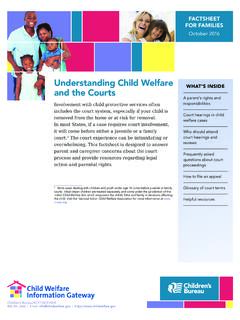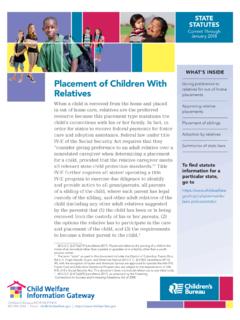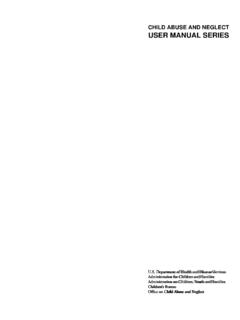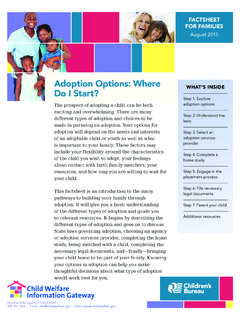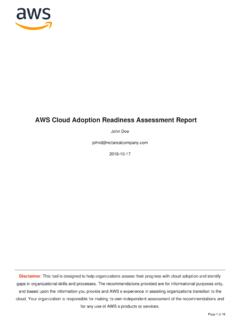Transcription of Intestate Inheritance Rights for Adopted Persons
1 Children s Bureau/ACYF/ | Email: | STATUTESC urrent Through February 2016 Intestate Inheritance Rights for Adopted Persons WHAT S INSIDEB irth parents and Adopted childrenAdoptive parents and Adopted childrenAdopted children who are not included in a willSummaries of State lawsTo find statute information for a particular State, go to a will is the best way to ensure that heirs or descendants may inherit from your estate. Issues of property distribution may arise when a birth parent or adoptive parent dies without making a valid will or without naming an heir to particular property (referred to as intestacy). In these cases, State law determines who may inherit from whom. Laws in all 50 States, the District of Columbia, American Samoa, Guam, the Northern Mariana Islands, Puerto Rico, and the Virgin Islands specify an Adopted person s right to inherit from the estate of either adoptive or birth CuTehortuge FobTrn ayh 20y1re0 6ehnyun 2 This material may be freely reproduced and distributed.
2 However, when doing so, please credit child welfare Information Gateway. This publication is available online at Parents and Adopted ChildrenGenerally, the court decree that finalizes the adoption ends the legal relationship between the birth parent (also referred to as the biological or natural parent in the statutes) and the Adopted child . There are, however, exceptions to this policy in some States. For example: Alaska, Idaho, Illinois, and Maine provide for a continuation of Inheritance Rights if so stated in the adoption decree. In Kansas, Louisiana, Rhode Island, and Texas, an adoption decree terminates the right of the birth parent to inherit from the Adopted child , but the Adopted child may still inherit from the birth parent. Illinois allows the birth parents to acquire from the Adopted child s estate any property gained from them as a gift, through a will, or under Intestate laws. In Pennsylvania, an Adopted person may inherit from the estate of a birth relative, other than a birth parent, who has maintained a familial relationship with the Adopted person.
3 In approximately 14 States, if a child is Adopted by a stepmother or stepfather after his or her birth parent dies (as long as the deceased parent s parental Rights had not been terminated prior to his or her death), the Adopted child s right of Inheritance from or through the deceased birth parent or any biological relative is unaffected by the The word approximately is used to stress the fact that States frequently amend their laws. This information is current through February 2016. The States that provide for Inheritance from a deceased birth parent are Alaska, Connecticut, Florida, Georgia, Idaho, Iowa, Massachusetts, Minnesota, New Jersey, North Dakota, Ohio, Oregon, Tennessee, and by the spouse of a birth parent generally has no effect on the right of the Adopted child to inherit from or through that birth parent. In 11 States, when a child has been Adopted by a stepparent, the child may inherit from either birth parent, depending on the Alabama, Arizona, California, Colorado, Maine, Michigan, Montana, Oregon, South Dakota, Utah, and Parents and Adopted ChildrenUpon the entry of the final adoption decree, the Adopted child is treated by law as if he or she had been born to the adopting parents.
4 The Adopted child , therefore, gains the right to inherit from the adoptive parents and adoptive parents relatives. Adoptive parents and other adoptive relatives also gain the right to inherit from the Adopted Children Who Are Not Included in a WillIntestate law often applies to Adopted children who are not specifically named in the will of the Adopted parent. Usually this occurs when they are Adopted after the will was made and it was never updated or laws in approximately 44 States and the Northern Mariana Islands address this The States that provide for Intestate Inheritance for Adopted children who are omitted from a will include Alabama, Alaska, Arizona, Arkansas, California, Colorado, Connecticut, Delaware, Florida, Georgia, Hawaii, Idaho, Indiana, Iowa, Kentucky, Maine, Maryland, Massachusetts, Michigan, Minnesota, Mississippi, Missouri, Montana, Nebraska, Nevada, New Hampshire, New Jersey, New Mexico, New York, North Carolina, North Dakota, Ohio, Oklahoma, Oregon, Pennsylvania, South Carolina, South Dakota, Texas, Utah, Vermont, Virginia, Washington, West Virginia, and Wisconsin.
5 Generally, Adopted individuals are included in class gifts and other terms of relationship in accordance with the rules for Intestate The term class refers to all those Persons in the same category or level of Rights , such as heirs of a deceased person who are related by the same degree. For example, if a will stipulates that all children of the deceased parent are entitled to an equal share, the Adopted person is included whether or not he or she is specifically named. Also, when a parent fails to provide for any of his or her children, whether by accident or if the person was Adopted after the will was made, that person shall have a share of the parent s estate as if the parent had died Intestate . This last rule applies unless there is evidence that the omission was intentional or that the parent provided for the Adopted person outside the CuTehortuge FobTrn ayh 20y1re0 6ehnyun 3 This material may be freely reproduced and distributed. However, when doing so, please credit child welfare Information Gateway.
6 This publication is available online at publication is a product of the State Statutes Series prepared by child welfare Information Gateway. While every attempt has been made to be complete, additional information on these topics may be in other sections of a State s code as well as agency regulations, case law, and informal practices and Citation: child welfare Information Gateway. (2016). Intestate Inheritance Rights for Adopted Persons . Washington, DC: Department of Health and Human Services, Children s CuTehortuge FobTrn ayh 20y1re0 6ehnyun 4 This material may be freely reproduced and distributed. However, when doing so, please credit child welfare Information Gateway. This publication is available online at Parents in Relation to Adopted Person Citation: Ala. Code 43-8-48 For purposes of Intestate succession, an Adopted person is the child of an adopting parent and not of the birth parents, except that adoption of a child by the spouse of a birth parent has no effect on the right of the child to inherit from or through either birth parent.
7 Adoptive Parents in Relation to Adopted Person Citation: Ala. Code 43-8-48; 26-10A-29 For purposes of Intestate succession, an Adopted person is the child of an adopting parent and not of the birth parents, except that adoption of a child by the spouse of a birth parent has no effect on the right of the child to inherit from or through either birth adoption , the Adopted person shall be treated as if he or she was born to the adopting parents and shall have all Rights and be subject to all of the duties arising from that relation, including the right of Inheritance . Adopted Persons Who Are Not Included in a Will Citation: Ala. Code 43-8-91; 43-8-230If a testator fails to provide in his or her will for any of his or her children Adopted after the execution of the will, the omitted child receives a share in the estate equal in value to that which he or she would have received if the testator had died Intestate unless: It appears from the will that the omission was intentional.
8 When the will was executed, the testator had one or more children and devised substantially all his or her estate to the other parent of the omitted child . The testator provided for the child by transfer outside the will, and it can be reasonably proven that the transfer was intended to be in lieu of a testamentary Persons are included in class gift terminology and terms of relationship in accordance with rules in determining relationships for purposes of Intestate succession. AlaskaBirth Parents in Relation to Adopted Person Citation: Alaska Stat. ; final decree of adoption relieves the birth parents of the Adopted person of all parental Rights and responsibilities and terminates all legal relationships between the Adopted person and the birth parents and other relatives of the Adopted person. Thereafter, the Adopted person is a stranger to the former relatives for all purposes, including Inheritance , unless: The decree of adoption specifically provides for continuation of Inheritance Rights .
9 The interpretation or construction of documents, statutes, and instruments, whether executed before or after the adoption is decreed, expressly include the person by name or by some designation not based on a parent and child or blood decree terminating parental Rights on the grounds set out in (c)(3) [that the parent committed sexual assault or sexual abuse of a minor that resulted in the conception of the child ] voids all legal relationships between the child and the birth parent for all purposes, except that Inheritance Rights between a child and a birth parent are not voided by the decree terminating parental Rights , unless the decree specifically provides for the termination of Inheritance a parent of a child dies without parental Rights having been previously terminated, and a spouse of the surviving parent thereafter adopts the child , the child 's right of Inheritance from or through the deceased parent is unaffected by the Adopted person is the child of the person's adopting parent(s) and not of the person's birth parents, but adoption of a child by the spouse of either birth parent does not affect.
10 The relationship between the child and that birth parent The right of the child or a descendant of the child to inherit from or through the other birth parentAdoptive Parents in Relation to Adopted Person Citation: Alaska Stat. final decree of adoption creates the relationship of parent and child between petitioner and the Adopted person, as if the Adopted person were a legitimate blood descendant of the petitioner, for all purposes, including Inheritance . CuTehortuge FobTrn ayh 20y1re0 6ehnyun 5 This material may be freely reproduced and distributed. However, when doing so, please credit child welfare Information Gateway. This publication is available online at Persons Who Are Not Included in a Will Citation: Alaska Stat. ; individuals and their descendants, if appropriate to the class, are included in class gifts and other terms of relationship in accordance with the rules for Intestate a testator fails to provide in his or her will for children who were Adopted after the execution of the will, the omitted after- Adopted child receives a share in the estate as follows: If the testator did not have a child living when he or she executed the will, an omitted after- Adopted child receives a share in the estate equal in value to that which the child would have received had the testator died Intestate , unless the will gives all or substantially all of the estate to the other parent of the omitted child and that other parent survives the testator and is entitled to inherit under the will.
